The BMW E34 is the third generation of the BMW 5 Series, which was produced from 1987 until 1996. Initially launched as a sedan in January 1988, the E34 also saw a "Touring" wagon (estate) bodystyle in September 1992, a first for the 5 Series. BMW replaced the E34 with the E39 5 Series in December 1995, although E34 Touring models remained in production until June 1996. The E34 generation marked the first time all-wheel drive was incorporated into the 5 Series with the 525iX, and the first V8 engine to be used in a 5 Series. The E34 also saw the introduction of stability control (ASC), traction control (ASC+T) a 6-speed manual transmission and adjustable damping (EDC) to the 5 Series range. There was an unusually large range of engines fitted over its lifetime as nine different engine families were used. These consisted of straight-four, straight-six and V8 engines. The E34 M5 is powered by the S38 straight-six engine and was produced in sedan and wagon body styles.
- stability control
- traction control
- all-wheel drive
1. Development
Development ran from July 1981 to early 1987, with the initial design proposal penned by Ercole Spada in 1982.[1] Under the guidance of chief designer Claus Luthe, BMW based much of the design on the E32 7 Series. Following Spada's departure from BMW and styling approval in 1983, J Mays finalized the design for production in mid-1985. In December 1987, the E34 sedan was unveiled to global press.[2][3] Special attention was paid to aerodynamics, with the E34 basic sedan having a drag coefficient of 0.30.[4]
2. Body Styles
-
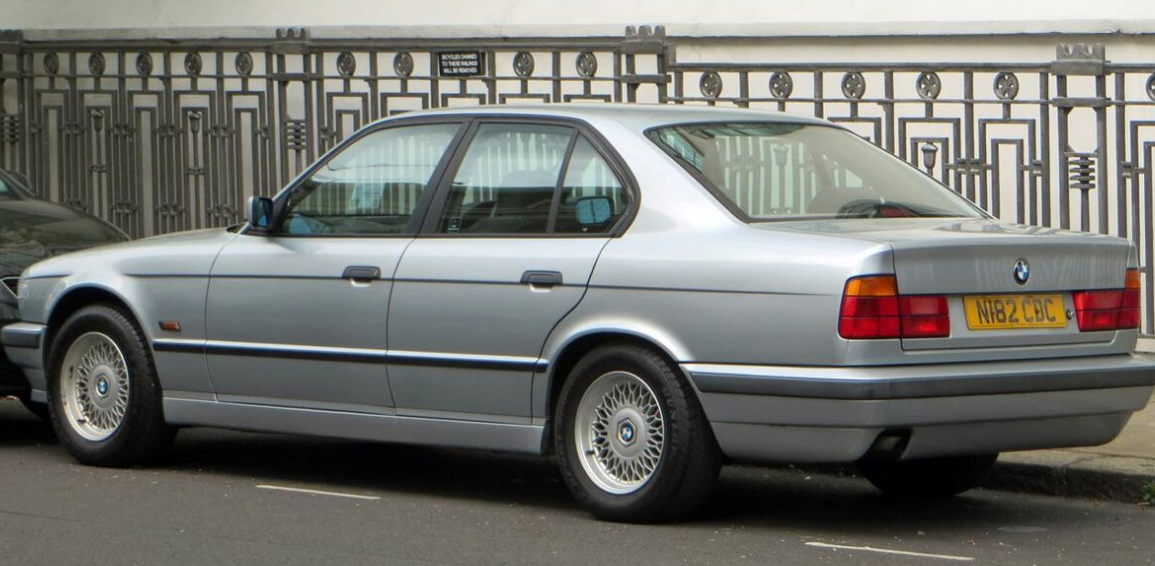
E34 sedan
-
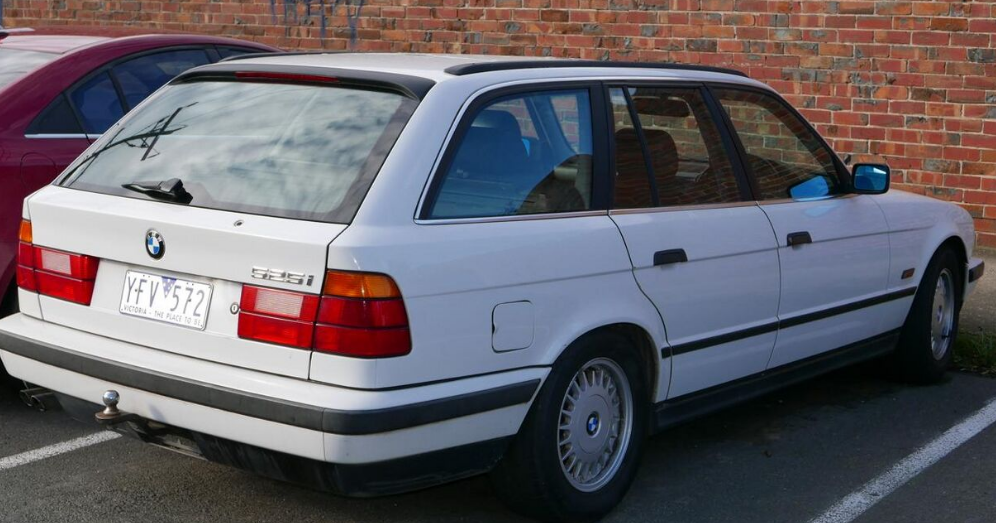
E34 Touring
3. Engines
Official output figures are as follows:[5]
3.1. Petrol
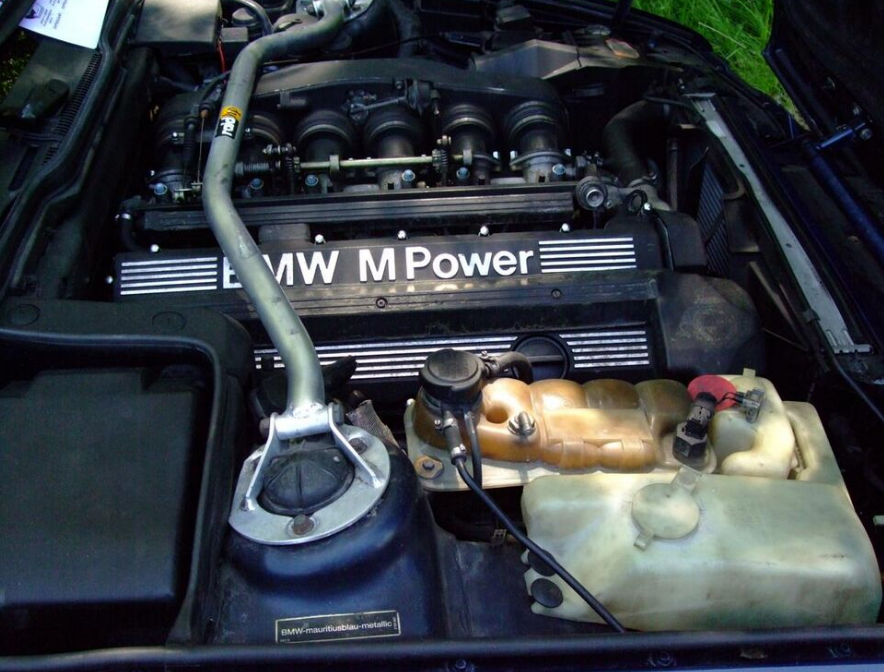
| Model | Years | Engine | Power | Torque |
|---|---|---|---|---|
| 518i | 1989–1994 | M40B18 inline-4 |
83 kW (111 hp) at 5,500 rpm | 165 N⋅m (122 lb⋅ft) at 4,250 rpm |
| 1994–1996 | M43B18 inline-4 |
85 kW (114 hp) at 5,500 rpm | 168 N⋅m (124 lb⋅ft) at 3,900 rpm | |
| 520i | 1988–1990 | M20B20 inline-6 |
95 kW (127 hp) at 6,000 rpm |
164 N⋅m (121 lb⋅ft) at 4,300 rpm |
| 1989–1992 | M50B20 inline-6 |
110 kW (148 hp) at 6,000 rpm |
190 N⋅m (140 lb⋅ft) at 4,700 rpm |
|
| 1992–1996 | M50B20TU 6-cyl |
110 kW (148 hp) at 5,900 rpm |
190 N⋅m (140 lb⋅ft) at 4,200 rpm |
|
| 525i | 1988–1991 | M20B25 inline-6 |
125 kW (168 hp) at 5,800 rpm | 222 N⋅m (164 lb⋅ft) at 4,300 rpm |
| 1991–1992 | M50B25 inline-6 |
141 kW (189 hp) at 6,000 rpm | 245 N⋅m (181 lb⋅ft) at 4,700 rpm | |
| 1992–1996 | M50B25TU inline-6 |
141 kW (189 hp) at 5,900 rpm | 250 N⋅m (184 lb⋅ft) at 4,200 rpm | |
| 530i | 1988–1991 | M30B30 inline-6 |
138 kW (185 hp) at 5,500 rpm | 260 N⋅m (192 lb⋅ft) at 4,300 rpm |
| 1992–1996 | M60B30 V8 |
160 kW (215 hp) at 5,800 rpm | 290 N⋅m (214 lb⋅ft) at 4,500 rpm | |
| 535i | 1987–1992 | M30B35 inline-6 |
155 kW (208 hp) at 5,700 rpm | 305 N⋅m (225 lb⋅ft) at 4,000 rpm |
| 540i | 1992–1996 | M60B40 V8 |
210 kW (282 hp) at 5,800 rpm | 400 N⋅m (295 lb⋅ft) at 4,500 rpm |
| M5 | 1988–1992 | S38B36 inline-6 |
232 kW (311 hp) at 6,900 rpm | 360 N⋅m (266 lb⋅ft) at 4,750 rpm |
| 1992–1996 | S38B38 inline-6 |
250 kW (335 hp) at 6,900 rpm | 400 N⋅m (295 lb⋅ft) at 4,750 rpm |
3.2. Diesel
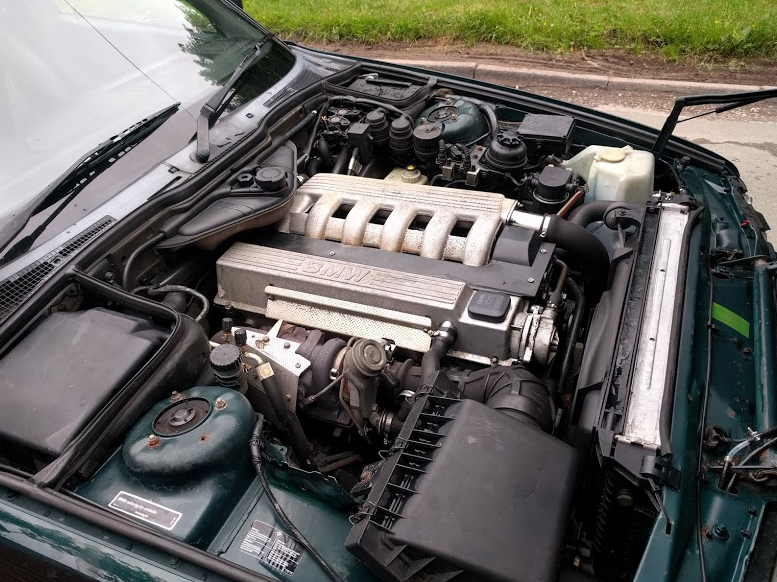
| Model | Years | Engine | Power | Torque |
|---|---|---|---|---|
| 524td | 1988–1991 | M21D24 inline-6 |
85 kW (114 hp) at 4,800 rpm | 222 N⋅m (164 lb⋅ft) at 2,400 rpm |
| 525td | 1993–1996 | M51D25 inline-6 |
85 kW (114 hp) at 4,800 rpm | 222 N⋅m (164 lb⋅ft) at 1,900 rpm |
| 525tds | 1991–1996 | M51D25 inline-6 |
105 kW (141 hp) at 4,800 rpm | 260 N⋅m (192 lb⋅ft) at 2,200 rpm |
4. Drivetrain
4.1. Manual Transmissions
- 5-speed Getrag 260
- 5-speed Getrag 280 — 3.6 L M5 model only[6]
- 5-speed ZF S5D 310 — M50 engines[7]
- 6-speed Getrag 420G — 540i and 1994-1996 M5 only
4.2. Automatic Transmissions
- 4-speed ZF 4HP22 - M20 and M30 engines
- 4-speed GM 4L30-E (A4S 310R) - M50 engines (US only)[8]
- 5-speed ZF 5HP18 - M50 and M51 engines[9] (except US) and 1992-1995 530i.
- 5-speed ZF 5HP30 - 540i
5. Suspension
Front suspension consists of double pivot MacPherson struts, with a replaceable shock absorber cartridge inside a steel strut housing. Control arms and thrust arms control front-to-back and side-to-side movement.[10](p300-1) Steering on most models is a recirculating ball design, however the all-wheel drive 525iX uses a rack and pinion steering system (along with front suspension similar to the E30 325iX model.[11] All front suspension components are steel, except that the lower control arms on some models are aluminum.
Rear suspension consists of semi-trailing arms with coil springs integrated in a strut assembly.[12]
6. Models
6.1. 518i
The base model, available only in Europe[5] with a total of 53,248 units produced, was initially powered by the four-cylinder M40 engine, which was replaced by the M43 in 1994. The 518i was available in sedan or wagon body styles, but with only a 5-speed manual transmission.[13]
6.2. 520i
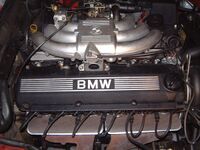
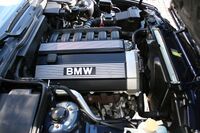
The base six-cylinder model and the base model in some countries, the 520i was the second most popular E34 model globally, with 426,971 units produced.[14] Initial production of the 520i started in January 1988, using the single-cam M20 engine. In 1990 the M20 was replaced by the twin-cam M50 engine, which was updated to the M50TÜ in September 1992 with the introduction of VANOS (variable valve timing). The M50-powered 520i was the most popular E34 variant sold in Europe.
6.3. 525tds
The 525tds was introduced in 1991 using M51 turbocharged inline six-cylinder diesel engine. Available in both sedan and wagon body styles.
6.4. 525i
A mid-range model in most regions (except North America), the six-cylinder 525i was the most popular E34 model globally, with 434,549 units produced.[14] Like the 520i, the 525i was initially powered by the M20 engine, which was later updated to the M50 and M50TÜ engines.
6.5. 525iX
The 525iX was the first all-wheel drive 5 Series, and the only all-wheel drive model in the E34 range. Powered by the M50 engine and available in both sedan and wagon body styles, it saw a total of only 9,366 units.[14] The centre differential normally would divide 36% torque to the front axle and 64% to the rear axle, but could adjust the ratio according to driving conditions in case one of the wheels started to slip. Unique to the 525iX was the use of a rack and pinion steering system.
6.6. 530i
There are two versions of the 530i: a six-cylinder model produced from 1988 to 1990, and a V8 model produced from 1993 to 1995. In total 57,570 units were produced. The earlier model, powered by the M30, was not sold in North America. The V8 version, which replaced the six-cylinder 535i in the lineup, was powered by the new M60 engine and was available in sedan and wagon body styles. Transmission choices for the V8 version were a 5-speed manual and a 5-speed automatic.[5] Initially, the V8 models were differentiated from other models by the wide grill; in 1994 the wide grill became available on other models.
6.7. 535i
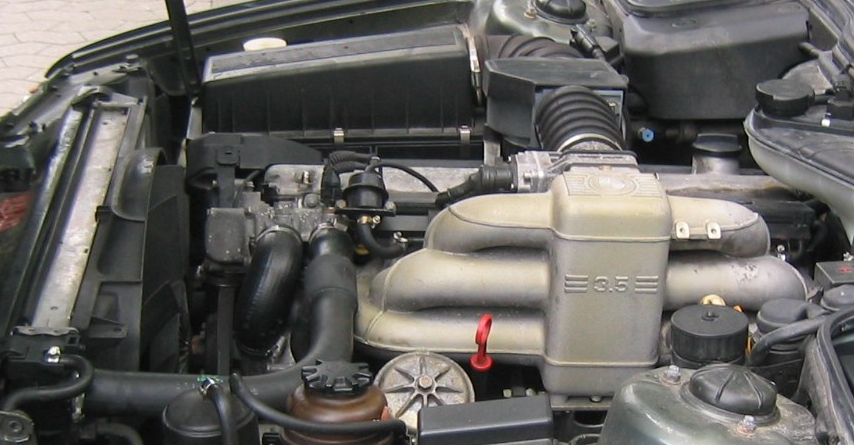
Powered the six-cylinder M30B35 and only available as a sedan, the 535i saw a total of 97,679 units produced,[14] which includes the Alpina B10 (BiTurbo, 3.5) models. The 535i was replaced by the V8 engine 530i and 540i models in 1993.
Despite the 535i designation and '3.5' casting on the intake manifold, the M30 6-cylinder engine found in the E34 535i was actually 3.4 litres (207 cu in).
6.8. 540i
In 1993, the 540i model was added to the top of the 5 Series lineup, powered by the M60 V8 engine and available in both sedan and wagon body styles (the latter not in US). Transmission options were a 6-speed manual (offered from 1994 to 1995 in North America for the 1995 model year, and from 1993 to 1996 in Europe) or a 5-speed automatic. A total of 26,485 units were produced[14], with only 3,203 units equipped with a manual transmission. Initially, the V8 models were differentiated from other models by the wider grilles. In 1994 the wide grilles became available on other models as well.
6.9. North American Model Range
The E34 range was launched in October 1988 in North America with the 525i and 535i 6-cylinder models for the 1989 model year.[15] Over the course of the E34 generation, the 525i Touring, 530i, 530i Touring, 540i and M5 models were sold in North America. The 3.6 L (220 cu in) version of the M5 remained in production until 1993,[16] by which time the 3.8 L (232 cu in) version was being produced for other regions.
7. M5 Version
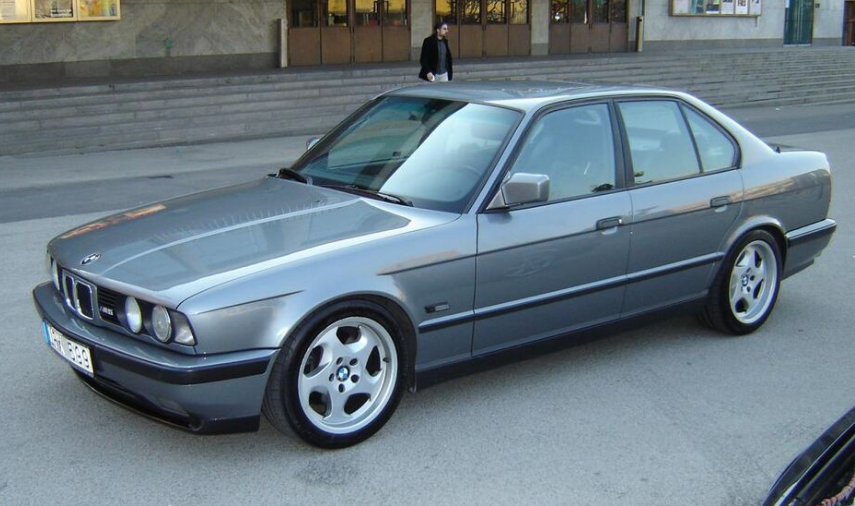
Introduced in September 1988[17] and produced until August 1995, the E34 M5 was produced in both sedan and Touring body styles, a first for the badge.
The E34 M5 is powered by the S38 straight-six engine, originally with a displacement of 3.6 L (220 cu in) and an output of 232 kW (311 hp; 315 PS), later upgraded to a 3.8 L (232 cu in) engine rated at 250 kW (340 PS; 335 hp). This 3.8 litre version of the M5 was first seen by the public at the 1991 Frankfurt Motor Show, where the E34 M5 Touring also saw its debut.[17]
In its last year of production the E34 M5, BMW used the Getrag 420G 6-speed manual gearbox, which was also used in the 8 Series and the 540i, as well as the subsequent E39 5 series.
8. Special Models
8.1. 518g
A model which could run on natural gas (as well as petrol) and was only sold in Germany. The 518g was based on the 518i Touring model and the only transmission available was a 5-speed manual.[18] The engine was a version of the BMW M43 four-cylinder engine, which was also used by the E36/5 316g model.[19] When running on natural gas, the engine produced 73 kW (98 hp),[20] compared with 84 kW (113 hp) when running on petrol. It was only produced in 1995 and just 298 units were built.[14]
8.2. 518iev Prototype
After unveiling the BMW E1 and E2 Electric Vehicles (EVs) in 1992, BMW began a project to show it was possible to make a full-sized electric car, something few others would countenance due to the weight of the battery technology at the time. To make it possible despite the lead-based batteries, the 518iev,[21] had a modified 4 cylinder drive-line fitted with CVT, battery packs and ground-breaking rotating-field AC electric drive. This configuration was the predecessor of present-day EV Hybrids. BMW built at least one fully functional E34 prototype; however, very little was recorded about it that exists online. Extensive testing of this (and many others) in the late nineties was carried out with partners such as Deutsche Post, however the company did not implement improvements in battery technology in the years following to advance electric technology in production until the ActiveE prototypes in 2010 (preceding the BMW i3 and i8) and 'Efficient Dynamics' models.
8.3. 540i M-Sport / M540i / 540i LE
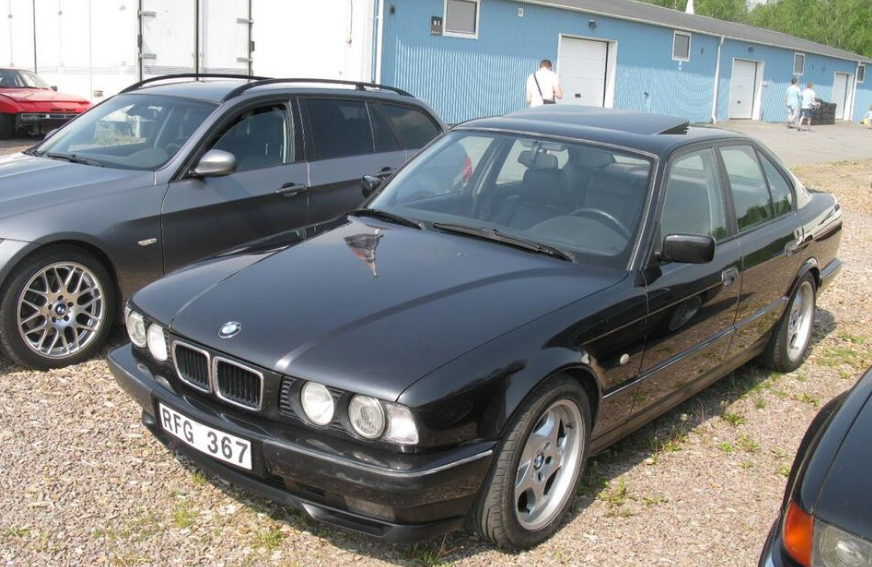
Because the M5 was discontinued for non-European markets in 1993, the 540i M-Sport model was built in 1995 for the North American market.[22] On top of the regular 540i features, additional features included sports suspension equipped with EDC, bolstered sport seats, servotronic steering, and US-spec M5 brakes.[23] 205 "M-Sport" models were built, 139 of them with the 6-speed manual transmission.[22]
The M540i model was sold in Canada. It includes the features of the North American 540i M-sport, plus upgraded Euro-spec M5 brakes, 18-inch M-parallel wheels, and various trim pieces.[24] Only 32 of these cars were built, all with a manual transmission.[22]
The 540i LE (ie. Limited Edition) sedan was sold in Australia[25] and the United Kingdom.[26] The 540i LE included the interior from the M5, "throwing star" M-System II wheels, EDC suspension with self leveling rear, Servotronic power steering, and front air dam. 70 of these 540i LE sedans were produced, all with a manual transmission, each individually numbered and identified by an engraved metal plaque stuck onto the centre console beneath the handbrake lever.[22]
9. Calendar Year Changes
9.1. 1988
- M5 model introduced
- 524td model introduced
- 4-cylinder 518i model introduced
- Driver's side airbag introduced
9.2. 1989
- 520i engine updated to the BMW M50, the first model to use the new DOHC straight-six engine
9.3. 1990
- 525i engine updated to the M50
- All-wheel drive 525iX model introduced
- 525tds diesel model introduced
9.4. 1992
- 520i and 525i engines updated to the M50TU, which introduced variable valve timing (VANOS)
- V8 engines introduced in the 530i and 540i models, which shared engines and transmissions with the E32 7 Series and E31 8 Series. The V8 models adopted a wider grille than other models.[27]
- M5 engine enlarged from 3.6 litres to 3.8 litres
- Revised exterior mirrors and hubcaps
9.5. 1993
- 525td model introduced
- 535i model discontinued,[28][29] marking the end of the 24-year production run of the M30 engine
- 6-speed manual transmission offered for 540i model, the first 6-speed manual available in a 5 Series
- ASC became available
9.6. 1994
- 518i engine upgraded from M40 to M43
- M5 adopted a 6-speed manual transmission
- Wider grille (previously used for V8 models only) became available for other models
10. Production
Production of the E34 commenced on November 2, 1987 for the 535i,[30] with 535i market launch being in January 1988 and other variants following a staggered launch. 520i and 530i production began in January 1988, for March 1988 market launch. Production of the 525i began in February 1988, being launched to market in April 1988, with the 524td entering production in March 1988 for May 1988 introduction. Touring production began in July 1992, after presentation at IAA 1991. Production ended for the sedan in December 1995 and Touring in June 1996.[31]
The production plants for the E34 were the Dingolfing plant in Germany and Rosslyn in South Africa.[32][33] Total production was 1,333,412 units.[34][35]
The content is sourced from: https://handwiki.org/wiki/Engineering:BMW_5_Series_(E34)
References
- "Ercole Spada, der Brief". Archived from the original on May 6, 2013. https://web.archive.org/web/20130506134635/http://www.e34-ig.de/der-e34/ercole-spada.html.
- https://www.welt.de/motor/news/article115355125/Tradition-25-Jahre-BMW-5er-E34.html
- "Ercole Spada Wanted to Make the E34 5 Series Look More Like the 8 Series". http://www.autoevolution.com/news/ercole-spada-wanted-to-make-the-e34-5-series-look-more-like-the-8-series-85494.html#.
- "BMW Remembers Third-Gen E34 5-Series, You Should Too". http://www.carscoops.com/2017/01/bmw-remembers-third-gen-e34-5-series.html. Retrieved 24 December 2017.
- "BMW 5-Series E34 versions & types". http://www.automobile-catalog.com/model/bmw/5-series_e34.html. Retrieved 25 March 2016.
- "5' E34 M5 3.6 Manual gearbox". http://www.realoem.com/bmw/en/showparts?id=HD91-EUR-04-1989-E34-BMW-M5_36&diagId=23_0289. Retrieved 22 February 2019.
- "5' E34 525i Manual gearbox S5D...Z". http://www.realoem.com/bmw/en/showparts?id=HD51-EUR-05-1992-E34-BMW-525i&diagId=23_1168. Retrieved 22 February 2019.
- "GM transmission and oil application chart". http://www.taligentx.com/passat/maintenance/atfchange/BMW_ATF.pdf. Retrieved 25 April 2017.
- "5' E34 525i Automatic gearbox A5S310Z". http://www.realoem.com/bmw/en/showparts?id=HD61-EUR-12-1992-E34-BMW-525i&diagId=24_1317. Retrieved 25 April 2017.
- BMW 5 Series Service Manual- 1989 to 1995. Bentley Publishers.
- "Any 525iX Owners?". http://forum.bmw5.co.uk/topic/63947-any-525ix-owners/. Retrieved 27 January 2018.
- "BMW E34 5 Series 520i Specs". http://www.ultimatespecs.com/car-specs/BMW/1657/BMW-E34-5-Series-520i.html.
- "5'E34 model selection". http://www.realoem.com/bmw/enUS/select?product=P&archive=1&series=E34.
- BMW Production Data. e30ic.com. p. 14. http://www.e30ic.com/BMWProductionData.pdf. Retrieved 10 March 2017.
- https://bmw-grouparchiv.de/research/detail/index.xhtml?id=3711392
- "Model selection: 5'E34 - Saloon - M5 3.6 - USA". http://www.realoem.com/bmw/en/select?product=P&archive=1&series=E34&body=Lim&model=M5+3.6&market=USA&prod=19930200. Retrieved 22 February 2019.
- "BMW M Registry - FAQ E34 M5". http://www.bmwmregistry.com/model_faq.php?id=12.
- Touring > 518g". http://www.realoem.com/bmw/enUS/select?product=P&archive=1&series=E34&body=tou&model=518g&market=EUR. " id="ref_18">"Model selection: 5'E34 > Touring > 518g". http://www.realoem.com/bmw/enUS/select?product=P&archive=1&series=E34&body=tou&model=518g&market=EUR.
- "BMW 518g Touring – Nothing But a G-thang". http://www.curbsideclassic.com/blog/cc-outtake/curbside-outtake-bmw-518g-touring-nothing-but-a-g-thang/. Retrieved 22 August 2019.
- "BMW 5 series E34 history and characteristics" (in ru-RU). 16 February 2015. http://bmwguide.net/bmw-e34-history-and-characteristics/. Retrieved 13 January 2017.
- "Back from the future: BMW prototype with hybrid drive". MOT magazine. 1995-04-02. Archived from the original on 2004-02-19. https://web.archive.org/web/20040219141434/http://www.metricmind.com/data/bmw.pdf. Retrieved 2004-02-19.
- "BMW M Registry - FAQ E34 M540i". 4 October 2013. http://www.bmwmregistry.com/model_faq.php?id=13. Retrieved 13 January 2017.
- "M5 Alternative: 1995 BMW 540i M Sport". 4 October 2013. http://bringatrailer.com/2013/10/04/m5-alternative-1995-bmw-540i-m-sport/. Retrieved 13 January 2017.
- "The 1995 540i M-Sport and 540i". http://www.kindel.com/bmw/m540_info.htm. Retrieved 3 December 2017.
- "1995 BMW 540i Limited Edition E34 Manual". https://www.redbook.com.au/cars/research/used/details/1995-bmw-540i-limited-edition-e34-manual/SPOT-ITM-210405#features. Retrieved 3 December 2017.
- "UK LE brochure". http://www.m5board.com/vbulletin/e34-m5-discussion/45576-uk-le-brochure.html. Retrieved 3 December 2017.
- "E34 facelift or not?". http://forum.bmw5.co.uk/topic/128771-e34-facelift-or-not/?tab=comments#comment-1388387. Retrieved 13 March 2018.
- "5'E34 535i model selection". http://www.realoem.com/bmw/en/select?product=P&archive=1&series=E34&body=Lim&model=535i&market=EUR&prod=19930400. Retrieved 13 March 2018.
- "Used BMW 535i review: 1988-1993". https://www.carsguide.com.au/car-reviews/used-car-review-bmw-535i-1988-1993-13434. Retrieved 13 March 2018.
- https://bmw-grouparchiv.de/research/detail/index.xhtml?id=3711210
- "Der erste Winter des neuen 5er BMW". https://bmw-grouparchiv.de/research/detail/index.xhtml?id=3381957. Retrieved 10 March 2018.
- "Vehicle manufacturer profiles". Archived from the original on 22 July 2011. https://web.archive.org/web/20110722125713/http://www.automotiveworld.com/oem-tracker/bmw-group/page/154.
- "History of the BMW 5 Series in SA" (in en). 21 March 2017. https://www.wheels24.co.za/News/Classic_cars/mzansis-amazing-fives-history-of-the-bmw-5-series-in-sa-20170321. Retrieved 30 December 2018.
- https://bmw-grouparchiv.de/research/detail/index.xhtml?id=3894795
- Kittler, Eberhard (2001). Deutsche Autos seit 1990, vol.5. Stuttgart: Motorbuch. p. 165. ISBN 3-613-02128-5.
